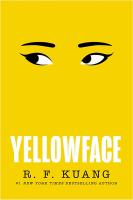
R. F. Kuang is known for her fantasy novels but steps outside of the genre in this satirical, unreliable-narrator novel. Yellowface is, if nothing else, a compulsively interesting read. Some of the Goodreads reviews are pretty divided on it, which I think is testament to the complexity of the satire that R. F. Kuang has introduced. Kuang, who is Chinese-American, writes from the perspective of a white woman whose friend is a successful Asian writer. When that friend dies in a freak accident, the narrator steals her manuscript and publishes it as her own work. What follows is a critique of publishing, social media, and the arts as a profession, with race and gender weighing heavily on it all.
I found some of Kuang’s commentary to be somewhat over-the-top or at least obvious. The narrator June Hayward (publishing under the suspiciously racially ambiguous name Juniper Song) says a lot of things that are flat-out racist and completely self-centered. And sometimes, she had some commentary that made sense, such as her thoughts on how bestsellers get “picked” and how social media can be a vicious place. This is what I found to be really interesting – Kuang has created a truly vile character in June, but I still felt like I understood her motivations and, inexplicably, felt a little anxiety at the thought that her plagiarism might be found out. Even though I hated June and had been hoping the whole time that the scheme would be uncovered!
It’s also interesting that Athena Liu, June's deceased friend and a character who has a great deal of similarities to R. F. Kuang herself, was a flawed character. While some of the perspective we get on Liu is muddied by June’s jealousy, there is valid commentary on how Liu pilfered personal stories of suffering and trauma from others and utilized them in her writing. Kuang also touches on cancel culture – the Twitter mob and their ferocity are definitely villainous from June’s perspective, but they are also rightfully calling June out on her actions. As a white woman who doesn’t work in publishing, I can’t speak too definitively on how well Kuang handles themes of race in the industry. But many of her satirical insights rang true from my understanding – for example, the tokenization of diversity and the limited opportunities of writers of color. If nothing else, Yellowface made me think.
Kuang excels at writing morally gray (at best) characters, and I sometimes even felt myself being gaslit by June Hayward’s narration – constantly questioning what was real and what was being skewed by June’s justifications. Yellowface is extremely interesting and worth a read just for the conversations you’ll have afterwards.
